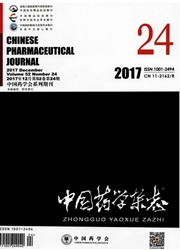

 中文摘要:
中文摘要:
目的通过聚乙二醇(PEG)将YPSMA—l单克隆抗体(mAb)和聚酰胺一胺(PAMAM)连接,合成新型的前列腺癌靶向基因载体PAMAM—PEG—mAb,提高基因的转染效率和前列腺癌细胞靶向性。方法运用NMR法鉴定合成的PAMAM—PEG—mAb裁体的结构,在前列腺癌细胞(PC3和LNCaP)上进行摄取实验和基因转染实验考察载体的生物学性质。结果通过结构鉴定确定PAMAM—PEG—mAb合成成功。细胞摄取实验表明,PAMAM—PEG—mAb的细胞摄取效率呈浓度依赖性。载基因后体外实验表明,PAMAM经PEG修饰后转染效率和前列腺癌靶向性无明显变化,再经mAb修饰后LNCaP细胞显著增加,而PC3细胞反而有下降。结论PAMAM—PEG—mAb载体是一种有潜力的前列腺癌靶向基因转运载体。
 英文摘要:
英文摘要:
OBJECTIVE Aim to construct a novel polymer gene delivery system based on a new kind of dendrimer-poly- amidoamine (PAMAM). With the modification of polyethylene glycol (PEG) and YPSMA-1 monoclonal antibody (mAb), PAMAM- PEG-mAb was successfully synthesized as a novel gene vector targeting to the prostatic cancer. METHODS NMR was used to char- acterize PAMAM-PEG-mAb. The cellular uptake and prostatic cancer (PCa) distribution experiments were employed to explore its bio- logical characteristics and PCa cell ( PC3 and LNCaP) targeting ability. RESULTS NMR results demonstrated the successful synthesis of PAMAM-PEG-mAb. The cellular uptake of vectors was concentration-dependent. The ~ene expression in vitro indicated that themodification of mAb could increase the gene expression efficiency and PCa targeting ability of PAMAM vectors to LNCaP ( PSMA overex- pressing prostate cancer cells). CONCLUSION PAMAM-PEG-mAb is a potential gene delivery vector targeting to PCa.
 同期刊论文项目
同期刊论文项目
 同项目期刊论文
同项目期刊论文
 Reducible chimeric polypeptide consisting of octa-D-arginine and tetra-L-histidine peptides as an ef
Reducible chimeric polypeptide consisting of octa-D-arginine and tetra-L-histidine peptides as an ef Biodegradable Stearylated Peptide with Internal Disulfide Bonds for Efficient Delivery of siRNA In V
Biodegradable Stearylated Peptide with Internal Disulfide Bonds for Efficient Delivery of siRNA In V Current status of gene therapy for hepatocellular carcinoma, with a focus on gene delivery approache
Current status of gene therapy for hepatocellular carcinoma, with a focus on gene delivery approache Combination of Microneedles with PLGA Nanoparticles as a Potential Strategy for Topical Drug Deliver
Combination of Microneedles with PLGA Nanoparticles as a Potential Strategy for Topical Drug Deliver Anti-DR5 monoclonal antibody-mediated DTIC-loaded nanoparticles combining chemotherapy and immunothe
Anti-DR5 monoclonal antibody-mediated DTIC-loaded nanoparticles combining chemotherapy and immunothe 期刊信息
期刊信息
